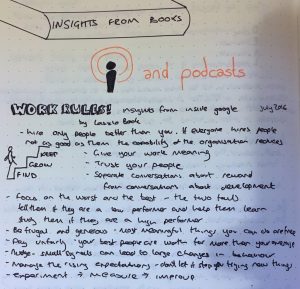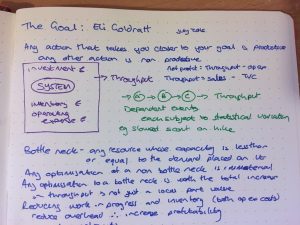How to read a business book (for Dyslexics)
Start with a goal in mind
Ask yourself: why? Why are you reading a book? No this is not have having a crisis of confidence as an adult dyslexic reader. Having a clear intent is key for the following steps. The intent might be really specific (can I use the concepts of this book in project x to enable y) or quite general (what can I learn from this to help me be a better manager/programmer/insert job here). If you don’t have a goal in mind I’d argue you are not reading for self-development but for pleasure – that’s good but its different. I tend to do most of my “reading” while driving to work thanks to audio books. When I switched to audiobooks I found I got through about 5x as many books a year. However, I discovered that my recall of the material was hindered if I just passively listened. Many of these strategies were developed to help me retain the key concepts from the books I was listening to.

Alternatives to reading
If reading is something you struggle with, ask yourself do you have to read a book? If the aim is to learn something are there other ways of achieving that goal? Most of my self-directed business reading is done with audible. I am on a book a month plan £3.99/month (for the first 3 months, £7.99/month thereafter) so I can keep informed of relevant books without needing to turn a page. The selection of books on Audible has grown massively recently and now top new titles often come out in audio format at the same time as dead tree versions. Books and audiobooks are great as they contain a wealth of knowledge, there are reviews so you can judge what you might get from them and they are very low cost. But if they don’t help move you closer to your goal then they are not effective.
Straying further from books are there any (free) online courses that cover the concept? MOOCs (massive open online learning) are very popular now and offer top notch education for free. I have learned how to programme iOS with Stanford University through iTunes University. I enriched my SCUBA diving adventures by learning Marine Archaeology at the University of Southampton without leaving the house (for the course – I have to leave the house to go diving) thanks to the MOOC on Future Learn. I used Coursera to study Innovation for Entrepreneurs by the University of Maryland. Many scheduled online courses are supplemented by online instructors and social forum sites giving avenues to ask questions on challenging content. Some even require peer marking which is a great way of seeing other perspectives. If there is not an online course covering what you want is there a real world course?
If courses are not your thing why not find an expert mentor or shadow a practitioner? Most people love sharing their expertise on topics they are knowledgeable about and even if you pay them for their time it can be cheaper than a course while offering a more tailored experience. One thing to be mindful of here is that some experts are very talented at what they do but are not great at breaking it down into learnable chunks. If investing in this type of learning check they have a good track record of helping other acquire the skill they are expert in.
If you must read
I am assuming you struggle with reading – if not why are you reading this post on a blog aimed at the neurodiverse? Like most of my advice, this is aimed at those of us that think differently but the techniques will work just as well for the neurotypical. Start by scanning the table of contents. This is to start forming a mental model of what is in the book, what concepts are introduced and then covered in more depth later. For bonus points look at the page counts and formulate a plan of attack – if you want to finish the book by the end of the month how many sections will you need to read each day to get there. Don’t assume you have to read the whole book and don’t assume you need to read the book in sequential order.
Whether you read a book or decide to get the information in some other way the following steps apply. I’ll use the word book but it could equally apply to audio-book, online course, or mentor.
Active listening / reading
As you read (listen) try and capture key notes. For paper books, underlining key bits of text and writing in the margins is the order of the day. I have a special section at the back of my journal for audiobooks and podcasts. In addition at the end of every chapter (or module of course) try to summarise that chapter. The aim of this is twofold – to check you have captured the key points and secondly to act as a review summary for later reference. If you are getting mentoring the same applies – what are the key points you need to remember.
Before starting the next chapter ask yourself if this is working: is it getting you closer to your goal. I recently read the book Nudge with the aim of learning a technique to influence without removing peoples’ choice. It was a fascinating book, with great case studies. But not written in a way that enabled me to put it into practice. I decided not to finish the book as while it was interesting it was not giving me what I needed. Don’t be afraid to abandon something that’s not working.
If you are struggling with a topic scan back through the table of content – is it revisited later and if so might that help with the understanding? If not and the topic is essential to meeting the goal get on google. Book summaries and reviews may offer a slightly different explanation that helps the understanding. Slideshare can be really useful here as people give their takes on various books. If the topic is not essential capture notes to reflect there are elements you don’t understand and move on.
I find complimenting an audio-book with a hard copy is a powerful combination for enabling chapter reviews. Audio-books are great for sequential listening but cannot rival paper books great for dipping in and recapping a specific section.
Some books have key points summarised at the end of chapters. Some even have knowledge checks at the end of chapters that are a great way of self-assessing comprehension of the key points.
Take action towards the goal
If you read but do nothing with your new found knowledge what value do you really get from it? The structure of some books might require you getting to the end before you can start putting it into practice but many allow incremental adoption of new techniques. Courses are really good in this respect because at the end of each section there is normally a practical exercise that gives you the chance to put your learning into practice and in doing so review how well you have grasped the concepts. There is a model of development called the 70/20/10 model. It suggests only 10% of our learning comes from books and training. A further 20% comes from feedback and seeing good and bad examples of the concepts (e.g. Seeing how your colleagues apply it). A massive 70% of learning comes from the repeated application of the concepts against increasingly difficult assignments. If the goal you set was important don’t stop 10% of the way there.
Review, recap, refresh
So you got to the end – of the book or of this post – both might have been a feat of endurance. Sadly it’s still not time for tea and medals. Capture your last chapter review and then reread all your chapter reviews. Have you got a good overview of the content? Are there extra things you want to capture? Did you struggle and find a good resource that might be of use with future books? Did you try and implement some of the concepts and learn something not covered in the book? Capture all of this while it is fresh.
With the content reviewed it’s time to review the goal. Have you achieved what you set out to do or is there more to learn? Do you need another book or a different resource to carry on the learning?
And still, it doesn’t finish… From time to time recap on your book summaries to refresh your understanding. It is quite common to learn something new, put it into practice with great zeal and then gradually over time return to previous behaviours. Additionally, if you read a lot when you return to a topic you’ll be able to draw new connections with things that on first pass you didn’t know.




Pingback: Achieve the impossible - Differently Wired
Pingback: Presence – a book summary – Differently Wired
Pingback: The Dyslexic Advantage Book Summary – Differently Wired
Pingback: Achieve the impossible – Differently Wired